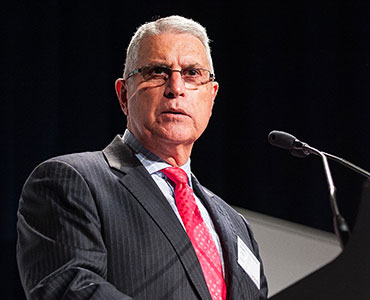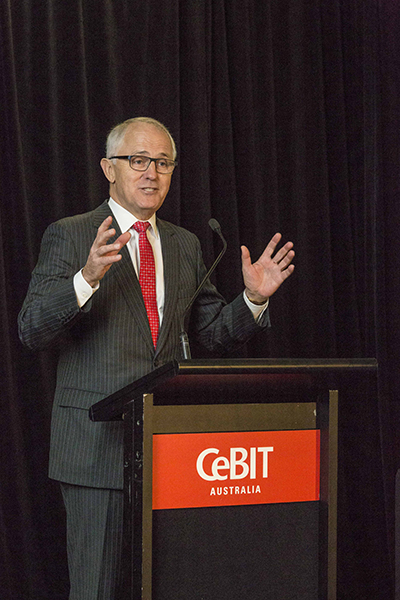Digital Business insights by John Sheridan >>
LEADERSHIP requires the ability to formulate and then describe a vision – that offers a worthwhile destination with a set of goals along the way.
Leadership requires the ability to explain the journey, along with an acceptable timetable.
“Where are we going?” “We are going this way.” “And this is how we are going to get there.”
It’s obvious really.
And in the same way that a destination is important for the scout troop as they head off into the wilds, it is even more important for a country heading into the future.
Where are we going as a nation? That is what everybody wants to know.
Yet nobody at a political level seems to be able to answer this question.
It is a simple question. Where are we going? 
What are the objectives for our country? We need to know these first before we set off on any journey because the destination affects the direction we go in.
Simple stuff.
But if you asked anybody in this country the question, “Where are we going as a country?” you would get a range of answers, none of which are particularly inspiring.
“I haven’t got a clue.” “Backwards.” “To the dogs.” “Off a cliff.” “In circles.” “Back to the 50s.” “Into the next available iceberg.” I have heard them all.
No mention of bright futures.
Which is, of course, madness.
As individuals we rarely act like this. We don’t usually pile into the family car and drive around meaninglessly for hours unless we want trouble. Accompanied by a host of angry questions.
As individuals most of us have some idea of where we are going. So you would think this is even more important for a nation.
But there is no commonly agreed upon vision. There is nobody on the bridge of the ship of state steering us in the right direction. Or any direction.
Our ‘leaders’ are preoccupied with the state of the ship, with how much fuel there is in the bunker, but have no idea of where we are going.
And in the absence of direction, our ‘leaders’ have become preoccupied with blame. “They got us lost.” “They don’t know where we were going either.” “It’s their fault.”
Irrelevant. It no longer matters.
There is not much talk of a destination, only discussion of the state of the nation.
So where are we? Where are we going next?
“The mining boom has finished.” “We are living beyond our means.” “We don’t have enough income.” “We have to fix the budget.”
But what for?
If we don’t know where we are going, what our goals are, and what it takes to achieve them, then what are we fixing the Budget for?
We are fixing the budget so that we can….do what?
We have lost touch with reality.
We should be heading somewhere as a country. We should have goals. Goals that are articulated, accepted and understood by everybody.
Not a woolly 2050 plan, full of vague objectives. But a 2015 plan with a clear destination.
With broad sweeping and simple objectives.
As individuals, we should have some idea, and intuitively we do. The majority of Australians did not buy into the Federal Budget last year because it was perceived as unfair and unequitable.
So fairness and equity are probably things most of us can agree upon as objectives even if we can’t necessarily agree how to achieve them. That is why the term “fair go” has resonance in this nation. It is something we agree upon.
We should be heading towards a cleaner, smarter, healthier, fairer, more resilient, open and transparent, and collaborative society. We should be translating these broad objectives into many simple steps that will take us there.
We need more jobs. We need to cultivate and support value-adding industries such as advanced manufacturing, biotech and clean energy. We need to support start-ups, create smarter cities, expand intelligent connectivity – the internet of things, improve transport and vastly expand rail, and share inspiring stories of export success. There are many.
We need to own the capacity and capability to expand, and cultivate and manage these things within Australia. There are some serious implications concerning sovereignty, IP, investment and reward involved in this journey, and we have to understand these clearly and partner with other nations when necessary and on a shared value basis.
It is a disruptive time and it is easy to get distracted by fear, uncertainty and doubt when such a lot is going on. That is what magicians rely on, when using sleight of hand. It is important for us not to get distracted.
We have to be clear on our objectives and that clarity only comes when we know where we are going.
We need to address climate change, digital disruption, homelessness. We need to work on fair go – equality, the obvious lack of leadership, access to food and water, health and the informed patient and most of all jobs.
We know that there should be no children or indeed anybody sleeping on the streets at night, but there are. We know Aboriginals should be better off than they are today. We know we need to broaden the base of industries that offer jobs, so we are not beholden to any one industry to the extent they gain unfair advantage.
We need to put Australia at the centre of our vision, not allow multinationals to overly influence, define, decide and own the results of our national investment.
There is a balance required between our best interests and the interests of other nations or multinational companies and we need to be clear on where that balance lies. A fair go again.
Jobs are disappearing because of automation, robotisation and computerisation. Jobs are being transformed as we move into the new digital world. This problem is far bigger than most suspect.
Real unemployment is more than 13 percent and 2-3 times that for the young. We have to significantly broaden the base for jobs, and put more resources into education, not less.
How do we motivate and leverage our enormous collective capability and resources to move in the direction we want to go as a society?
That requires leadership. And a clearly defined vision. With a destination and a beginning for the journey.
There is a much bigger discussion to be had on this subject.
Fixing the car is important but only if you intend to drive it. And if you do, you need places to go, destinations to visit.
Deciding how much fuel to put in the tank is important but this must relate to the direction and length of the journey.
We need to shift the discussion from fixing the Budget. That is a secondary issue, not the primary issue at this time.
The primary issue is simple.
Where are we going?
Once we know that, we know exactly what we need to get there (budget).
Control of destiny. Leadership not confusion.
We have become overly concerned with what must be cut and limited, and not concerned enough with what must be imagined, designed and created.
This is time for reform.
But where are we going as a nation? What are our goals? What is the vision? What is the direction?
That is where we need to begin our reformation.
*
John Sheridan is CEO of Digital Business insights, an organisation based in Brisbane, Australia, which focuses on helping businesses and communities adapt to, and flourish in, the new digital world. He is the author of Connecting the Dots and getting more out of the digital revolution. Digital Business insights has been researching and analysing the digital revolution for more than 12 years and has surveyed more than 50,000 businesses, conducting in-depth case study analysis on more than 350 organisations and digital entrepreneurs.
http://www.db-insights.com/
ends


 How to resolve AdBlock issue?
How to resolve AdBlock issue? 




